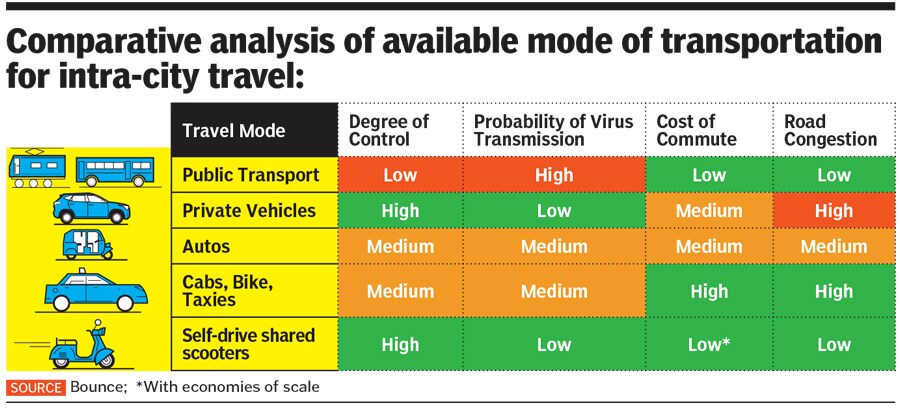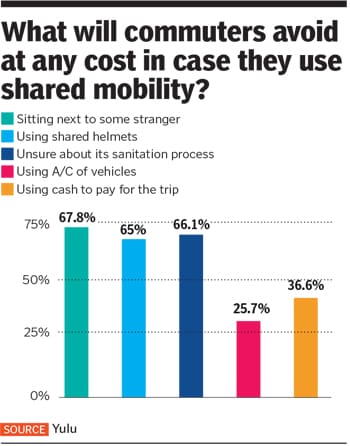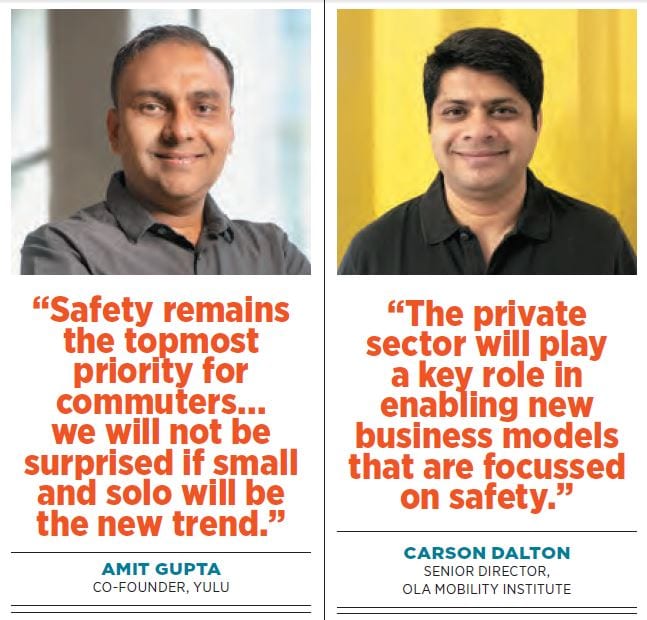Share the ride, not the virus
As the pandemic influences what commuters want, ride-sharing startups are innovating with products and services


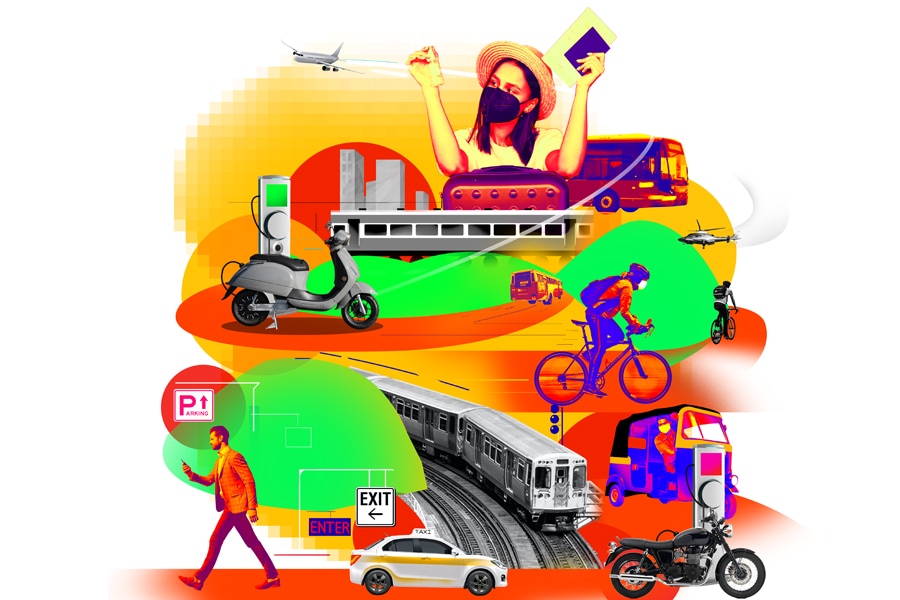 Illustration: Sameer Pawar[br] The Covid-19 outbreak, and the consequent need for maintaining hygiene and social distancing norms, is expected to influence the way people commute. The changes that were taking place in the mobility sector—with the emergence of ride-hailing services for two- and four-wheelers—could therefore witness an acceleration.
Illustration: Sameer Pawar[br] The Covid-19 outbreak, and the consequent need for maintaining hygiene and social distancing norms, is expected to influence the way people commute. The changes that were taking place in the mobility sector—with the emergence of ride-hailing services for two- and four-wheelers—could therefore witness an acceleration.
In India, most people rely on public transport, and that is not expected change in a hurry. But what could happen is a shift to a combination of public transport and shared mobility, with ride-hailing ventures, be it for scooters or taxis, ramping up new and innovative models to demonstrate that their services are safe and affordable.
“The world has been well on its way to a transport system that is hybrid [part public transport and part shared], electric and data-driven. Covid-19 has only increased the pace of this transformation process,” says Vivekananda HR, co-founder of Bounce, a scooter rental company. “There is a strong reason to believe that owned-vehicle commute will dwindle within the foreseeable future. At the same time, the very definition of ownership will transform, as intra-city mobility will evolve as a service”. He gives the example of China, which, after the lifting of lockdowns, has seen a paradigm shift in consumer behaviour away from public transport and towards private vehicles and docked or dock-less shared motorcycles and bicycles shared-motorcycle rides have gone up by 150 percent.
From an India point of view, there is a distinct possibility that we will be ahead of the global curve in this transformation as currently only 18 percent of Indians own any form of fuel-based vehicle. India saw this where mobile telephony was concerned, as vast parts of the country skipped the landline stage and directly jumped to mobile phones. However, greater focus on a holistic commuter system will be needed that can cater to different geographies and regions as per local needs, Vivekananda adds.
“We wanted to understand what urban commuters wanted post the lockdown,” says Amit Gupta, co-founder of Yulu. “So, we did a survey that clearly underlined that safety remains the topmost priority for everyone who is commuting.” Bengaluru-based Yulu is trying to popularise electric scooter-based shared mobility for first-mile and last-mile commutes.
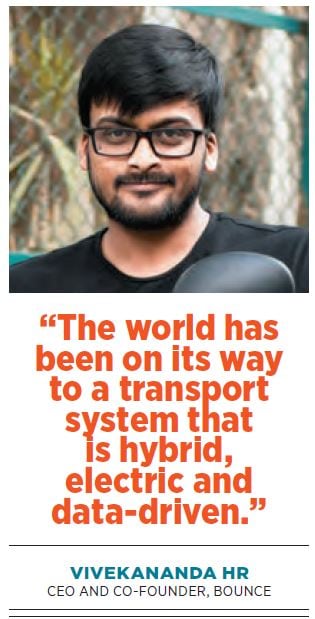
Yulu’s survey findings indicated that 22 percent of users preferred to rent a vehicle for the long-term and not share it, Gupta says.
Accordingly, it has introduced a long-term rental plan that lets users rent vehicles for up to 60 days, along with options of doorstep delivery and battery swaps. “We would not be surprised if small and solo will be the new big trend, and we are well geared to serve our future customers,” he adds.
“Covid-19 has altered the dynamics of mobility and transportation. Until we find a definitive cure or vaccine for the virus, there will be significant anxiety among people over the use of public transportation and taxis,” says Ashwarya Singh, co-founder of Drivezy, a car and scooter rental provider in Bengaluru. With social distancing becoming the new normal, there will be a shift towards personal means of mobility, he says.
Drivezy is seeing strong demand for monthly and weekly subscriptions of motorcycles and cars. Even during the lockdown, its motorcycles were moving around 6,000 essential workers in Karnataka and Telangana, he adds.
Vogo, which competes with Bounce, has added new services and products after the lockdown, says Anand Ayyadurai, its co-founder and CEO. The scooter rental provider offers options for a day to 2 months, offers a sanitisation check in front of customers, and a key-less exchange of vehicle, he adds.
New mobility options that are being provided by these startups are driven by technology, they use resources optimally, and provide safe, affordable, and efficient commutes that can be customised to the needs of specific regions. Bounce, for instance, offers scooter rentals for a single ride or even a year. “This is better than owning a vehicle, as the customer does not have to worry about its maintenance,” says Vivekananda.
The company is piloting a peer-to-peer sharing model that can unlock the potential of under-utilised vehicles. For instance, in Bengaluru there are close to 70 lakh two-wheelers registered as private vehicles, with an average usage of less than 10 hours a week. It is possible to help three to four times the number of people to commute without adding a single extra two-wheeler on the road, he says.Internet of things (IoT) can play a big role in ensuring safety, says Ravneet Phokela, chief business officer at Ather Energy, which makes high-end electric scooters. Ather’s vehicles are equipped with navigation systems that display route maps, and could show Covid-19 hotspots in a city or on the route that a rider will be taking. Riders can also be alerted if they are too close to another vehicle and not maintaining social distancing. “There are many things that IoT can do, we just need to make the right use of it,” he says.
Technology will play a big role in building awareness and making better decisions. This has been demonstrated during the pandemic, with the proliferation of real-time data and analyses helping the government, local bodies and individuals.There are many outcomes that the combination of IoT-based connected vehicles and the right algorithms can enable to make mobility safer, both for personal and shared vehicles. “In all of these, it is extremely important to adhere to the proper data storage and usage standards to prevent any misuse of personal data” says Phokela.
Worldwide, people are changing how they commute, points out Vinay Raghunath, automotive sector leader at EY India. There has been a considerable increase in the number of cyclists in post-Covid-19 Chinese cities commuters have also shown preference for two-wheelers for long-distance travels. Budapest, the capital city of Hungary, is creating new cycle lanes, with the city witnessing a 90 percent drop in public transport use. Mexico City is planning to quadruple its cycle network to reduce the pressure on its metro, he adds.
“We are likely to see changes in the urban transportation landscape and behaviour toward different travel options,” says Carson Dalton, senior director at Ola Mobility Institute, a think tank. “The private sector will play a key role in enabling new business models that are focussed on safety.” App-based two-wheeler, self-drive vehicles may see a spike in demand for long-term rentals, especially in tier 2 and 3 Indian cities, where people depend more on personal vehicles due to insufficient public transport infrastructures.
As employees of private companies begin to return to offices, specialised category services via business-to-business partnerships and public-private partnerships are likely to emerge. For instance, in Sydney, Ola has launched Ola Pro, a new service category for people who prefer a super-sanitised ride-share option. New business models such as Ola Emergency for medical- and health-related travel have emerged during the lockdown to provide transport to and from hospitals.The pandemic itself has renewed the focus on building sustainable and resilient cities. An outcome of this will be a growing emphasis on electric mobility therefore penetration of electric vehicles as a proportion of the fleet of shared mobility services will increase, especially for two and three-wheelers. Rapid adoption of electric vehicles in India will trigger new business models, including battery-swapping technology and battery charging options. As a result, in the long-term, environmental sustainability objectives may also be addressed.
First Published: Jul 08, 2020, 14:14
Subscribe Now